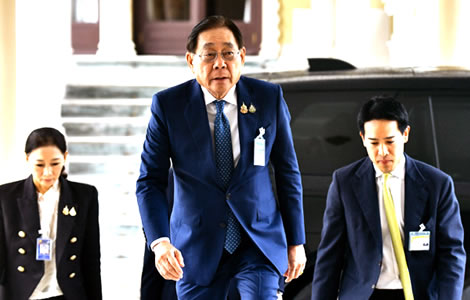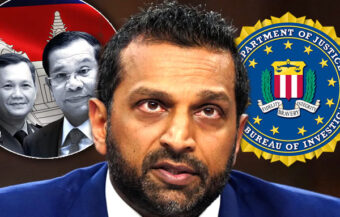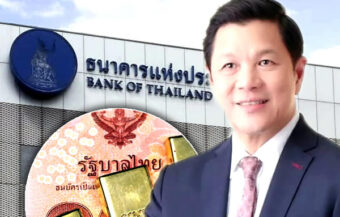Finance Minister Pichai Chunhavajira is set to meet with Bank of Thailand Governor Sethaput Suthiwatanaruput to discuss inflation and interest rates. As the baht appreciates, Pichai seeks policies to boost GDP growth while prioritising financial stability.
Bank of Thailand Governor Sethaput Suthiwatanaruput will meet Deputy Prime Minister and Minister of Finance Pichai Chunhavajira next week in what will be a showdown between fiscal and monetary policy chiefs. The finance minister wants to see a rise in inflation and interest rates to boost GDP growth. However, while the central bank chief is certainly poised to respond to a more volatile baht, he has also made it clear that his policy priority is to preserve financial stability.

Deputy Prime Minister and Minister of Finance, Mr. Pichai Chunhavajira, will meet with Mr. Sethaput, Governor of the Bank of Thailand (BOT), next week.
The meeting aims to discuss interest rate policies and their impact on the Thai economy. Especially in light of the recent appreciation of the baht.
The two economic chiefs will also discuss Thailand’s inflation rate policy. Pichai hopes to see better coordination between fiscal and monetary policies. His priority is to boost economic growth.
Therefore he has already advocated a looser inflation rate policy. Pichai additionally emphasises the importance of interest rate policy, particularly for investors. He noted that the interest rate is a key factor in stimulating economic activity.
Investors rely on low interest rates for projects as baht strengthened significantly in recent weeks
Investors often rely on low interest rates to fund their projects and ventures. Therefore, interest rates must align with the government’s growth strategies.
The baht has appreciated significantly in recent weeks. Certainly, it has reached its strongest level in 19 months. Pichai attributes this to external factors, particularly the U.S. Federal Reserve’s recent interest rate cuts.
Strong money inflows drive baht upwards. Business leaders warn it is time for urgent central bank action
US Federal Reserve rate cut piles pressure on the Bank of Thailand and its governor who is holding firm
The Fed’s decision has prompted money to flow from U.S. government bonds to developing markets, including Thailand. This is undoubtedly a key factor in the strengthening of the baht.
Pichai warns of negative impact on Thailand’s export competitiveness as inflation remains low
While the baht’s appreciation may appear favourable, Pichai warns it will harm Thailand’s export competitiveness. He compared the baht to other currencies of major trading partners, such as the Chinese yuan, Vietnamese dong, and Japanese yen.
If the baht appreciates more than these currencies, Thai exporters are in trouble. In brief, they may struggle to compete in international markets. He warns the strong baht puts Thailand at a disadvantage compared to its regional peers.
Pichai also expressed concerns about inflation and how it relates to interest rate policies. He highlighted that inflation in Thailand has remained lower than expected.
The Bank of Thailand had initially forecasted a rise in inflation, but the actual increase has been minimal. For instance, inflation grew by just 0.15% over the past eight months.
Thailand’s inflation target is set between 1-3%, with the government aiming for inflation close to 2%. However, current inflation levels are below the lower boundary.
Consequently, Pichai believes this warrants a review of the inflation framework.
Pichai suggests inflation rate should guide interest rates as high rates stifle economic growth
He suggests that the inflation rate should play a more decisive role in determining interest rates. Particularly if inflation remains low, which would imply that the economy is not growing as expected.
Pichai pointed out that high interest rates in the current economic climate will further stifle growth. He urged policymakers to consider whether the current rates are too high.
At length, they could discourage investment and hinder economic recovery. Thailand’s economy has been sluggish for a prolonged period, especially when compared to its neighbouring countries.
Pichai mentioned that this has led to various issues. Significantly, this includes rising household debt, increased debt among small and medium enterprises (SMEs), and growing public debt.
He emphasised that the government’s goal is to make the Thai economy more competitive globally. In effect, this requires coordinated fiscal and monetary policies.
Government aims to stimulate growth through budget while tax collection remains stagnant
The government is presently using its full budget to stimulate growth. Certainly, Pichai acknowledges that the economy has not yet shown significant improvement.
Despite the stagnant economy, tax collection remains at the same level. In turn, this highlights the need for policies that effectively stimulate economic activity.
Pichai stressed the need for better alignment between fiscal and monetary policies. He pointed out that while the government is working to stimulate economic growth, high interest rates counteract these efforts.
He argues that monetary policy, especially interest rates, should be adjusted. In short, they should complement the government’s fiscal initiatives. One concern raised by monetary policymakers is that lower interest rates could encourage excessive borrowing.
Pichai counters concern about debt as he calls for reasoned discussion on the economic situation
In turn, this could lead to higher debt levels. However, Pichai counters that if people have limited financial resources, lower interest rates would not necessarily lead to more borrowing.
He called for a reasoned discussion on this issue, based on the current economic situation. Pichai emphasises the importance of using available data to make informed decisions.
This includes both interest rate policies and inflation targets. He urged policymakers to collaborate on monetary and fiscal strategies. Indeed, he sees this as essential to guide Thailand out of its prolonged economic slump.
When asked about additional fiscal policies, Pichai explained that the government is operating within its budget framework.
It will adhere to fiscal discipline. He expressed optimism that the economy would improve in the coming months. At the same time, he noted that further progress is needed to fully address the country’s economic challenges.
Pichai indicates fiscal stimulus unlikely in last quarter as meeting aims to foster coordination
Regarding fiscal stimulus in the last quarter of 2024, Pichai said the results of current spending efforts would become clearer. However, he indicated that significant new measures were unlikely.
Certainly, they would not be introduced within the current quarter. In summary, Pichai’s meeting with the Bank of Thailand Governor aims to foster greater coordination between fiscal and monetary policies.
It comes at a time when Bank of Thailand Governor Sethaput Suthiwatanaruput is dealing with the baht’s rapid appreciation.
Correspondingly, this means a change of direction may be on the cards. However, financial stability remains the central bank’s watchword as opposed to GDP growth.
Join the Thai News forum, follow Thai Examiner on Facebook here
Receive all our stories as they come out on Telegram here
Follow Thai Examiner here
Further reading:
US Federal Reserve rate cut piles pressure on Bank of Thailand and its governor who is holding firm
Central bank holds interest rates. Economy will grow 2.6% in 2024 as Srettha pushes home ownership
Economy unlikely to grow in first quarter as Thai manufacturing crumbles. Hard choices ahead
New Finance Minister expected in April as economic malaise deepens with downgrades in GDP growth
Digital Wallet plan blown out of the water by corruption body on Tuesday warning of illegality


















